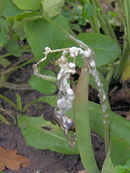Plant Pathology (2019) 68, 1694-1705
From Pestinfo-Wiki
 | Selected publication you are invited to contribute to the discussion section (above tab) |
Identification of factors associated with white mould in snap bean using tree-based methods
Plant Pathology 68 (9), 1694-1705
Abstract: Most processing snap bean fields are treated with fungicides at flowering to suppress white mould, one of the more significant diseases of this crop. Farmers would like to know when their fields are at sufficient risk of white mould, to plan fungicide applications or avoid spraying if the risk is below a tolerable threshold. In 2006, 2007 and 2008, observational data were collected from processing snap bean fields across western and central New York State, USA. White mould was found in 20% of fields. Boosted regression trees were used to model white mould presence or absence in a field (a binary response variable) as a function of agronomic and edaphic variables, and macroscale drought indices. The five most important predictors were canopy openness during pod development, the number of days after planting, hydrologic soil group, canopy openness during bloom and elevation. The risk of white mould increased by about 20% when canopy openness was less than 20 cm at the bloom stage and c. 30% when canopy openness was less than 30 cm at the pod stage. The most relevant interaction was between canopy openness at the pod stage and hydrologic soil group. A random forest model for predicting the presence of white mould by bloom had an estimated classification accuracy of 73%. The extension of these results to remote forecasting of white mould in processing snap bean production is discussed.
(The abstract is excluded from the Creative Commons licence and has been copied with permission by the publisher.)
Link to article at publishers website
Database assignments for author(s): Denis A. Shah, Sarah J. Pethybridge
Research topic(s) for pests/diseases/weeds:
environment - cropping system/rotation
Pest and/or beneficial records:
| Beneficial | Pest/Disease/Weed | Crop/Product | Country | Quarant. |
|---|---|---|---|---|
| Sclerotinia sclerotiorum | Beans (Phaseolus) | U.S.A. (NE) |